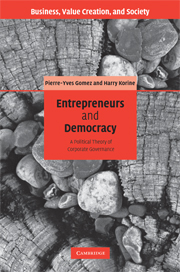Book contents
- Frontmatter
- Contents
- List of figures and tables
- Foreword
- Introduction
- Part I Establishing the ideological foundations: the contribution of liberal political philosophy
- Part II Understanding how corporate governance evolves: the contribution of history
- Part III Corporate governance and performance: the contribution of economics
- Introduction to Part III
- 7 The Pure Economic Model of corporate governance: an analysis
- 8 Critique of the Pure Economic Model of corporate governance
- 9 Economic performance, corporate governance, and the fragmentation of ownership
- Conclusion to Part III
- Epilogue
- Index
8 - Critique of the Pure Economic Model of corporate governance
Published online by Cambridge University Press: 22 September 2009
- Frontmatter
- Contents
- List of figures and tables
- Foreword
- Introduction
- Part I Establishing the ideological foundations: the contribution of liberal political philosophy
- Part II Understanding how corporate governance evolves: the contribution of history
- Part III Corporate governance and performance: the contribution of economics
- Introduction to Part III
- 7 The Pure Economic Model of corporate governance: an analysis
- 8 Critique of the Pure Economic Model of corporate governance
- 9 Economic performance, corporate governance, and the fragmentation of ownership
- Conclusion to Part III
- Epilogue
- Index
Summary
As successful as it has been in shaping the research agenda of economics and influencing the corporate governance structure of corporations over the last twenty years, the pure economic model (PEM) has also begun to face substantial criticism, of its empirical validity and of its internal logic. Indeed, many of its predictions have not been borne out by rigorous examination, and there are several non-trivial assumptions in the model's internal construction that merit reflection. Given the model's pretension to scientific truth and our sincere desire to evaluate its reach and merit, empirical failures have to be taken seriously (1). In this chapter, we will show that the empirical failures of the PEM are closely tied to the hypothesis that all of the shareholders' interests can be subsumed under profit maximization and that the incentives of management can be aligned to this objective (2). With the partition of property rights among several economic actors and the dispersion of the shareholding body among individuals pursuing different interests, it becomes very difficult to maintain the fiction of a unity of interests. The PEM appears to underestimate the degree of fragmentation in modern society and its effect on the behaviour of economic actors (3).
It is important to note that the current state of economic research does not permit the conclusion that corporate profits are maximized and thus also social benefits fully realized when the different parties to corporate governance pursue their own individual self-interests according to purely economic calculations.
- Type
- Chapter
- Information
- Entrepreneurs and DemocracyA Political Theory of Corporate Governance, pp. 251 - 273Publisher: Cambridge University PressPrint publication year: 2008



